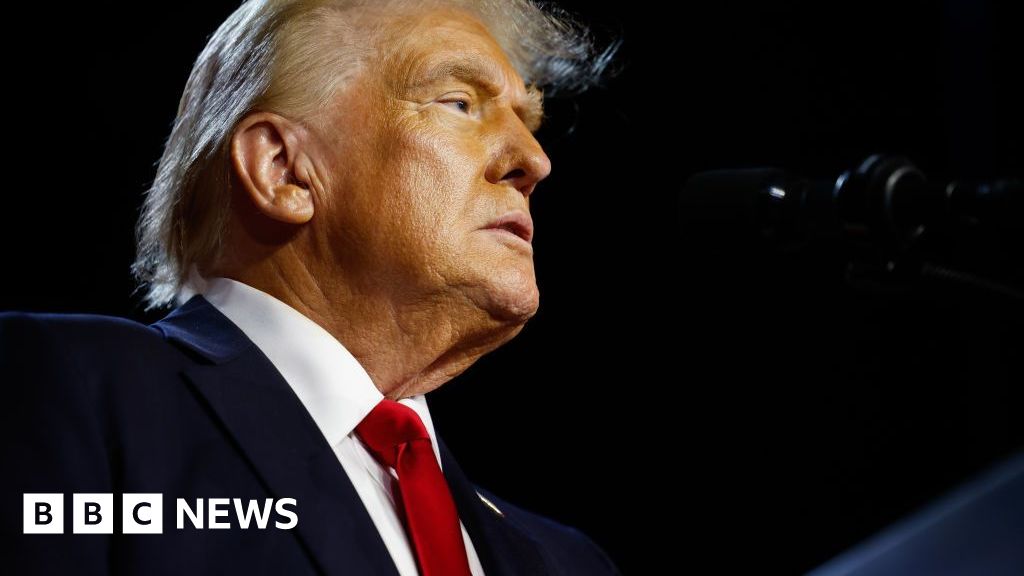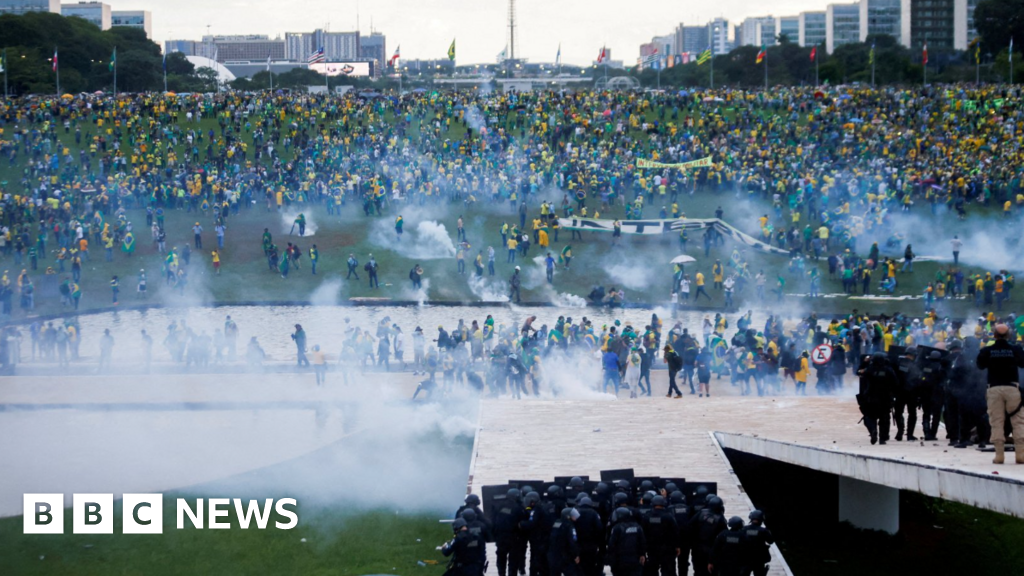ARTICLE AD BOX
By Yolande Knell
BBC News, Tel Aviv
Image source, EPA
Image caption,Israel has recently stepped up military exercises with regional allies
In the turquoise waters of the Red Sea, Israeli, Emirati and Bahraini naval forces for the first time just days ago rehearsed joint security operations with a US warship.
It followed a war-game at a desert airbase just north of the Israeli port city of Eilat last month, which sent fighter planes from Israel and seven other countries roaring into the skies.
Such drills aim to send a strong warning to Iran, which has recently been holding its own large military exercises, and stress strategic alliances.
But they come at a time when many in Israel are worrying about whether this small country could soon feel forced to act alone to attack Iran's nuclear programme militarily.
The government has allocated $1.5bn (£1.1bn) to prepare the Israeli armed forces for a potential strike against Iranian nuclear sites, and there are near-daily warnings from political and military leaders.
I have been seeking out the views of top Iran watchers and analysts on what might happen.
"Israel has no interest in a war with Iran, but we will not allow Iran to acquire nuclear weapons," an Israeli security official tells me. "In light of Iranian progress of their nuclear programme, we are preparing for all options and scenarios, including military capabilities."
The sabre-rattling comes as talks between Iran and five world powers (plus the US indirectly) on reviving the 2015 nuclear deal - known as the Joint Comprehensive Plan of Action (JCPOA) - are due to resume in the Austrian capital Vienna on 29 November.
The JCPOA limited Iran's nuclear activities and opened its facilities up to enhanced inspections in return for the partial lifting of international sanctions. However, it was abandoned by US President Donald Trump in 2018, with Israel's approval.
Image source, EPA
Image caption,Iran has always insisted its nuclear programme is for purely peaceful purposes
Just as the date for a new round of talks was fixed, Iran declared it had produced 25kg of uranium enriched to 60% purity - just below the level that would be needed for a nuclear bomb - and more than 210kg enriched to 20%.
While Tehran continues to insist its intentions are peaceful, even Iranian experts have pointed out that such quantities of highly-enriched uranium were previously only held by nuclear armed states.
"The Iranians today are closer to creating fissile material for nuclear weapons than they ever were in the past," the Israeli security official says. "This fact has significant security implications for the State of Israel."
The Israeli defence establishment estimates that if Iran decided to do so, it could now accumulate enough enriched uranium for one nuclear weapon within a month.
Iran nuclear crisis: The basics
- World powers don't trust Iran: Some countries believe Iran wants nuclear power because it wants to build a nuclear bomb - it denies this.
- So a deal was struck: In 2015, Iran and six other countries reached a major agreement. Iran would stop some nuclear work in return for an end to harsh penalties, or sanctions, hurting its economy.
- What is the problem now? Iran re-started banned nuclear work after former US President Donald Trump pulled out of the deal and re-imposed sanctions on Iran. Even though new leader Joe Biden wants to rejoin, both sides say the other must make the first move.
The manufacture of such a weapon would also require making a warhead that could be mounted on a ballistic missile. The timeframe for that is more difficult to calculate, but some experts say it could take 18 to 24 months.
Israel, which is assumed to have its own nuclear weapons but maintains an official policy of deliberate ambiguity, views a nuclear Iran as an existential threat; Iran does not recognise the Israeli state and its officials often espouse a belief that it will eventually cease to exist.
While the US and Arab Gulf countries, with which Israel has burgeoning ties, are also deeply opposed to Iran having nuclear weapons, it is not clear to what extent their own interests would hold them back from helping in any military confrontation.
Clock ticking
Former Israeli National Security Adviser Yaakov Amidror, who is now a senior fellow at the Jerusalem Institute for Strategy and Security, first warned of the dangers of Iran's nuclear ambitions in the early 1990s, when he worked in military intelligence.
He has a bleak assessment of the latest developments.
"Israel cannot live with a situation in which the Iranians are getting closer and closer to the bomb, and it will soon have to make a decision how to stop it," he says.
"I don't see any other way but to bomb it, because I don't see the Iranians retreating from their dream of having a nuclear umbrella under which they can be even more aggressive than they are today."
Israel has twice acted alone to destroy its enemies' nuclear reactors - in Iraq in 1981, and in 2007 in Syria - with little retaliation.
But many analysts question whether it is capable of effectively mounting a complex operation to stop Iran's much more advanced nuclear programme, which involves multiple sites with some underground facilities, and what price it would have to pay.
"Everyone in Israel understands that [a strike] might lead to a very complicated war," concedes Mr Amidror.
Iran has pledged "a shocking response" to any such attack. It is assumed it would use its own forces and co-ordinate with its well-armed proxies spread across the region: Hezbollah in Lebanon, which has tens of thousands of rockets, Shia militias in Syria and Iraq, Yemen's rebel Houthi movement, and Islamic Jihad militants in the Gaza Strip.
Image source, Getty Images
Image caption,An Israel-Iran war would almost certainly also involve pro-Iranian militant groups from around the region
Despite the grave risks, some hawks in Israel calculate that a strike could be worthwhile, even if it only set back Iranian nuclear plans by a few years.
But the official preference is still promoting peaceful, negotiated solutions.
"I hope that the diplomatic channel will succeed," says Sima Shine, a former head of research for the Mossad intelligence agency, "but I don't give it a high chance right now."
US President Joe Biden's administration has proposed to Iran a straightforward return to "mutual compliance" with the JCPOA, but Israel's government opposes that.
The deal lifts many restrictions on Iran's nuclear programme as soon as 2025 and did not put limits on Iran's ballistic missile development or curb its support for militant groups across the region.
"My evaluation of Iran's position is that it actually does not want to go back," says Ms Shine, who now heads the Iran programme at Israel's Institute for National Security Studies.
"What they would like to see, of course, is a reduction of sanctions and they understand that they have to pay something in order to get it. The question is what is the calculus of Iran - how deeply does its economy need relief?"
Her fear is that nuclear talks could just be a way of biding for time, as the country allows its increasingly advanced centrifuges to keep spinning, building up stockpiles of enriched uranium.
Covert actions
Another veteran Iran specialist, Alex Vatanka at the Middle East Institute in Washington, emphasises Tehran's deep ideological commitment to its nuclear programme.
But despite its mistrust of the Europeans and the US, he believes Iran does want to come back to the JCPOA to ease domestic economic pressures; he sees its recent actions and demands as "strengthening its hand".
Image source, EPA
Image caption,Iranian officials have spoken of Iran's nuclear programme as a matter of national pride
Mr Vatanka theorises that Iran does not necessarily want nuclear arms.
"It's an option they would like to have, clearly, but it's not about weaponising," he says, suggesting Iran could stay on the nuclear threshold.
"It's about Iran being a crucial nuclear state and making the point to the Americans that regime change is not going to happen."
Israel's threats of a strike do not convince him. He suggests that its clandestine efforts could be more effective at holding up Iran's nuclear progress.
"They have proven they can do that," Mr Vatanka comments. "Iran is clearly totally infiltrated at a high level. There's definitely a flow of information that they have."
More recently, Iran has blamed Israel for the dramatic assassination of its top nuclear scientist, Mohsen Fakhrizadeh, who was shot dead near Tehran with an AI-assisted, remote-controlled machine gun, and damaging explosions at its nuclear facilities.
Image source, Reuters
Image caption,Iran said an explosion at its Natanz nuclear facility in July 2020 was the result of "sabotage"
As part of what it terms its "war between the wars" Israel has also carried out hundreds of military strikes to reduce Iranian entrenchment in neighbouring Syria and the movement of precision guided munitions to Hezbollah.
Proliferation fear
Although there are many differences among experts about what will happen next, there is a consensus that upcoming talks on Iran's nuclear plans come at a critical time and that the stakes for this volatile region could not be higher.
If Iran develops its own nuclear arsenal, other powers - Saudi Arabia, Turkey and Egypt - are likely to follow suit.
Washington has said it wants to end "forever wars" in the Middle East. But it has also warned that it will look at "other options" when it comes to Iran, and it too has been seen flexing its military muscle.
Today, IDF F-15 fighter jets escorted two American B-1B bombers and an American KC-10 refueler through Israeli skies on their way from the Gulf.
The joint flight demonstrates our continued cooperation, which is crucial to the security of Israel and the Middle East. pic.twitter.com/v3cjy09xmW
The BBC is not responsible for the content of external sites.View original tweet on Twitter
In a symbolic move, at the end of the recent Israeli air exercise, a US warplane capable of carrying a buster-bunking bomb that could be used to target underground nuclear sites was escorted through through Israeli airspace by two Israeli fighter jets.
The paradox - as strategists are keen to drive home - is that serious preparations for military action against Iran could be the best way to stop it from happening.

 2 years ago
44
2 years ago
44








 English (US)
English (US)